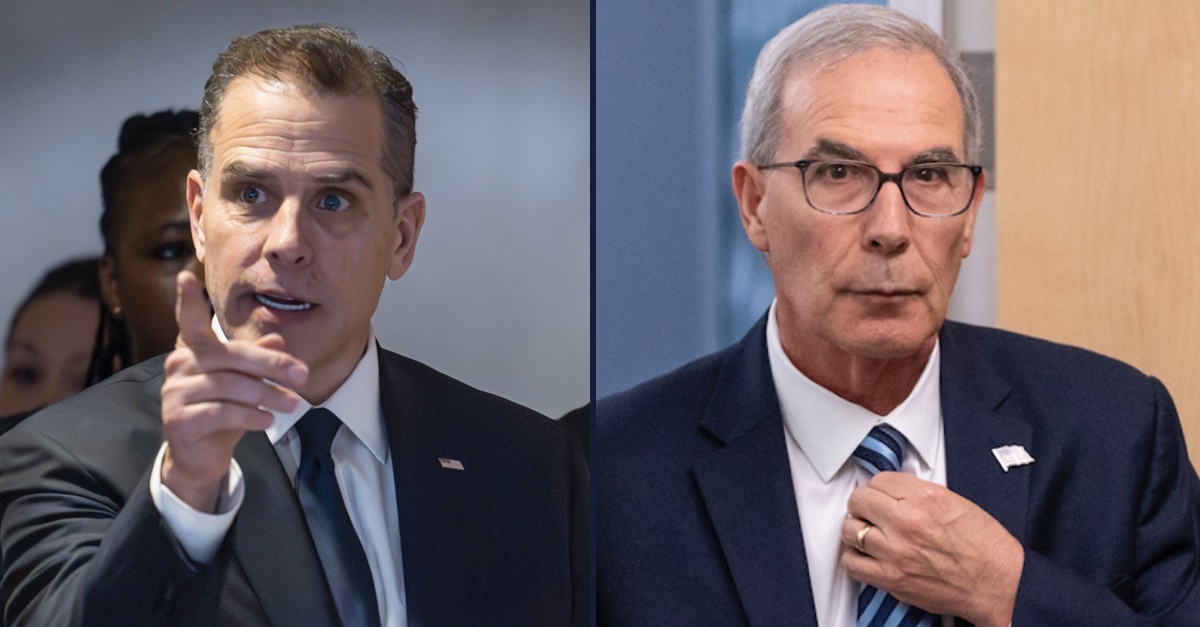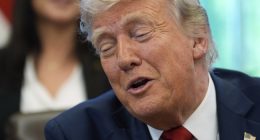
Left: Hunter Biden (AP Photo/J. Scott Applewhite); Right: Special counsel David Weiss (AP Photo/Alex Brandon)
The prosecutor overseeing the federal gun case against Hunter Biden, 54, outlined the government’s trial strategy in a court document filed earlier this week. Biden, in response, fiercely pushed back.
Special counsel David Weiss and the defense recently battled it out over a series of last-minute pre-trial motions and evidentiary requests as each side aimed to shape the way the fast-approaching trial will be conducted and overseen by U.S. District Judge Maryellen Noreika.
To hear the government tell it – and jurors will – the trial will be a long, drawn-out, catalogue of the defendant’s journey, oftentimes literally in the form of cross-country trips, as “a crack addict.”
“The Defendant knew he was a user of crack and knew he was a crack addict,” one suggested demarcation point for the government suggests in one of many such documents recently filed in the case.
In a 20-page trial brief filed on May 20, the government does not mince words about what they intend to try and prove to a Delaware jury sitting in the Delaware District Court in Wilmington.
“The Defendant, Robert Hunter Biden, chose to lie on a federal background check form required for the purchase of a firearm by falsely stating he was not an unlawful user of a controlled substance or an addict, when in fact he was both,” the trial brief begins. “By lying, he was able to illegally buy a gun on October 12, 2018, and he chose to illegally possess that firearm until it was taken from his possession on October 23, 2018.”
The prosecution intends to showcase lengthy travels in which the defendant back-and-forth visited Los Angeles, California and his home state, with one Massachusetts weigh station in between, often in search of and finding cocaine in rock form, interspersed by several short stints in rehab, always a relapse back into drug use, and then, finally, back to Delaware where he allegedly obtained a gun under false pretenses on the date charged in the three-count indictment.
“The defendant was an unlawful user of a controlled substance, that is, crack cocaine, or was a drug addict,” the trial brief reads. “The defendant knowingly possessed a firearm, that is a Colt Cobra 38SPL revolver with serial number RA 551363, while he was an unlawful user of a controlled substance or a drug addict…At the time the defendant knowingly possessed the firearm, he knew he was an unlawful user of a controlled substance or a drug addict.”
More Law&Crime coverage: ‘The Special Counsel is wrong’: Hunter Biden resists ‘concerning’ way prosecutors plan to use book ‘admissions’ on drug addiction against him at trial
Biden, for his part, insists the government is being too cavalier and expansive with the definitions – specifically taking issue with the source Weiss uses to try and define some key terms. The defendant’s attorneys filed their response in a 9-page trial brief submitted May 23.
“[H]e has a right to his opinion about testimony that has not yet occurred, but Mr. Biden objects to the Special Counsel’s legal claims defining a user of controlled substances or addict,” the defense brief argues. “The Special Counsel makes the curious argument that the Court should follow the definitions created by the Treasury Department’s regulations, but then asks that the Court excise any unfavorable language from those regulations.”
Weiss says the “definition of an unlawful user of a controlled substance is based on the definition utilized by the Treasury Department in its gun regulations” and cites precedent from the Eighth Circuit for allowing a jury instruction based on those regulations. Delaware, however, is in the Third Circuit. The government also cites “at least one” case where that definition was allowed – in a Western District of Pennsylvania case.
The defense says the government is actually misstating the relevant precedent from the Eighth Circuit over those regulations and, aside from that, argues that the “Treasury regulations would unlawfully expand the scope of criminal liability” and “violate the Second Amendment in doing so.”
More Law&Crime coverage: Prosecutor mockingly responds to Hunter Biden’s demand to avoid mention of his ‘extravagant lifestyle’ in gun trial
Weiss hinted at even further details likely to be raised during the trial in a hearing before Noreika on Friday.
While the trial brief says the government intends to call Biden’s ex-wife and two former romantic partners he was not married to in order to substantiate the timelines of the defendant’s addiction, during the hearing, the prosecution said they intended to call upwards of 12 witnesses in total, according to a report by NBC News.
Details of the defendant’s drug use are likely to be relevant to the case, the court ruled. At the same time, President Joe Biden’s adult son got a much-sought-after win as the court determined the state will not be able to tell jurors about the defendant’s “extravagant lifestyle.”
Biden and the government will each likely be instructed by the judge to hew closely to the drug addiction and use issues.
More Law&Crime coverage: Hunter Biden insists ‘salacious’ allegations about spending on ‘adult entertainment’ and ‘escort services’ must not be brought up at gun trial
The defense also previewed the heart of what they will try and convince jurors: that Biden did not think, so he could not know, that he was an addict when he admittedly bought the gun in question.
“[T]he issue here is Mr. Biden’s understanding of the question, which asks in the present tense if he ‘is’ a user or addict,” the defense brief reads. “The terms ‘user’ or ‘addict’ are not defined on the form and were not explained to him. Someone, like Mr. Biden who had just completed an 11-day rehabilitation program and lived with a sober companion after that, could surely believe he was not a present tense user or addict.”
The younger Biden’s trial is slated to begin on June 3 and is forecasted to run for just shy of two weeks.
Have a tip we should know? [email protected]








